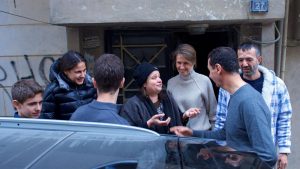Can there be anything more cynical or staged than Syria’s president driving calmly from Damascus to Eastern Ghouta on a bright day in March?
Yes, actually. There was the September 2016 video of Bashar Assad doing much the same thing, tooling his car capably, confidently and with a smile, into Darayya, a rebellious town south-west of Damascus that had been starved into submission after an extended siege by Syrian government forces.
The only difference between the Darayya video and that from Ghouta is the make of Assad’s car. In 2016, he drove a Hyundai. This year, it was a Honda. Both were silver. Like Assad, the chosen vehicles were light, bright and shiny, seemingly untouched by the spreading stain of darkness after much bloodshed, unsullied by the grief and uncertainty hanging heavy over Syrians at home and those forced to flee abroad.
Then there was the November 2017 video of Assad in the Black Sea resort of Sochi, Russia, telling Russian President Vladimir Putin and his top generals about Syria’s “gratitude for all of the efforts that Russia made to save our country.”
Assad’s trademark calm affability was in evidence; the camera didn’t see any sign of the toll one might expect from a leader worn down by a grinding war with its spiralling body count and grievous accounts of hundreds of thousands displaced.
Assad did not show up to be filmed in Darayya, Ghouta or Sochi as president of a country unmoored. He played the lead role in a reality TV version of “The Syria of Assad,” a show that has run for nearly half a century.
The histrionic ability appears to run in the family. In January, Assad’s always impeccably accoutred wife, Asma, starred in a video celebrating the silver jubilee of the Syrian National Symphony Orchestra. The show — how could it be anything but, in the capital of a country devastated by the eighth year of a civil war — had “a minute of silence on the souls of the martyrs.” So went the gushing account of the official YouTube Channel for the Presidency of the Syrian Arab Republic.
Asma Assad exited the venue with self-assured grace, navigating the throng with loose-limbed strides in nude high-heeled court shoes even as she casually shrugged into a chic short leopard-print jacket. She wore a dark burgundy dress, its colour striking the only sombre note in the symphonic display of Assad family chutzpah.
Even those who might be disgusted could hardly fail to be amazed. It’s true that, for years, Syria has been a never-ending series of images for the wider world but they are not like these. The images out of Syria are not sanitised but horrifying and deeply troubling — civilians choking allegedly from chlorine gas attacks; rows of bodies in shrouds; 3-year-old Alan Kurdi of Kobane lying dead on a Turkish beach as a tragic consequence of his family’s attempt to reach Europe; shell-shocked children, such as Omran Daqneesh, 5, in Aleppo after an air strike; harried refugees lining up to face an uncertain welcome in the Middle East and further afield.
Over the long years of this war, the Assads’ alternative reality has acquired some purchase on the collective imagination, provoking fascination and wonder. Did Assad and his wife really not notice anything amiss when they drove Brad Pitt and Angelina Jolie to lunch in Damascus? Vogue’s now-scrubbed cover story on Asma Assad, headlined “A Rose in the Desert,” betrayed no distress at the mounting violence. Instead, the photo shoot showed Bashar Assad serenely playing with his children in an apartment that was clearly not a palace.
When “Assad: The Movie” is finally in the can, sometime in the next decade or so, the Ghouta, Darayya, Sochi and Damascus opera rushes will surely make the final cut.
The Assads stick to a script that seems to put the war in the category of a weather phenomenon — unfortunate, but no matter what, always bring your own sunshine. As well as your own videographer.


